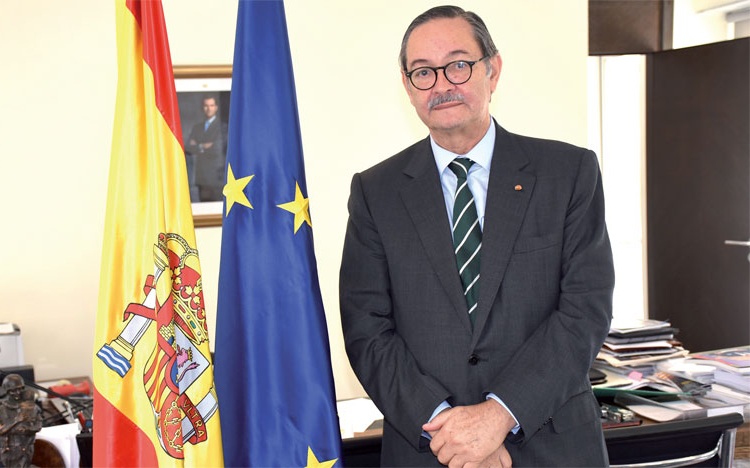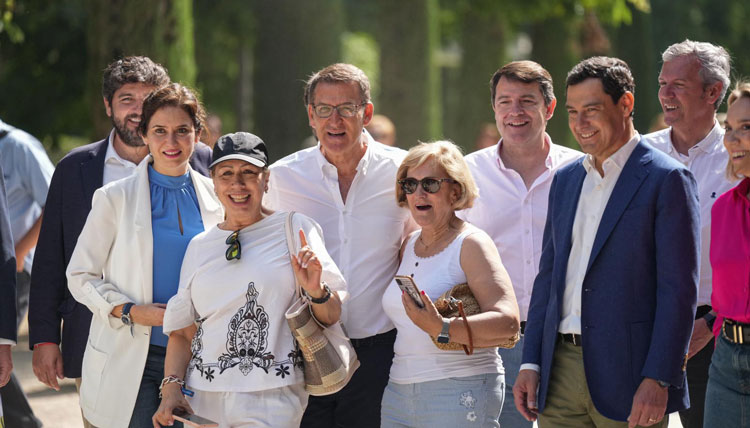Luis Ayllón
The Government will grant a new extension to the current ambassador to Morocco, Ricardo Díez-Hochleitner, who will turn 70 on the 30th, the retirement age for civil servants, but who will remain in the post for several more months, as a result of the early general elections, reliable sources have told The Diplomat.
Normally, diplomats who reach retirement age at the head of an embassy are dismissed, but in some cases, the government of the moment decides to keep them in their posts for a while longer, due to the situation in the country where they are accredited or because there is an interim situation in Spain as a result of electoral processes.
Although at one point there was some debate as to whether ambassadors should be dismissed upon retirement and reappointed, in the end the criterion that has remained in the State’s legal offices is that this is not necessary, because it is an appointment decided by the Council of Ministers and their dismissal must also be agreed by the government, regardless of the age of the person concerned. In fact, some current ambassadors who do not belong to the diplomatic career are over 70 years old, as is the case of the ambassador to the Holy See, former minister Isabel Celáa, who was appointed ambassador to the Vatican in January 2022, at the age of 72.
Díez-Hochleitner was appointed to the post of ambassador to Rabat on 29 May 2015, just over eight years ago by the government of Mariano Rajoy, and confirmed by the current government of Pedro Sánchez. This is an unusually long period of time for Spanish diplomatic practice – where ambassadorial posts usually last three or four years – but various circumstances have made it possible for Díez-Hocthleiner to stay on.
The ups and downs of relations with Morocco, always delicate, have made it advisable to delay the changeover. Especially after Sánchez’s April 2022 about-turn in Spain’s position on Western Sahara, the Government thought it unwise to change the ambassador and informed Díez-Hochleitner that he would remain in the post until his retirement.
However, the early general elections have stalled any moves to appoint new ambassadors, so Díez-Hochleitner will remain in the post until the elections are held and a new government is in place, i.e. at least until September.
In principle, no legal act will be necessary and he will remain in office until a decision is taken on her replacement. This was the case a few years ago, when in 2015 and 2016, due to the interim situation in which Rajoy’s government found itself, the tenure of several ambassadors was extended for more than a year, including Javier Elorza in Rome and José Ignacio Carbajal in Moscow, who had already reached retirement age.
More recently, at the end of 2020, the government decided to keep Carlos Bastarreche at the head of the Embassy in London, after his retirement, until the United Kingdom’s exit from the European Union. Bastarreche remained in London for two more months, but in February 2021 he expressed his wish to leave the post. His departure was followed by a long period of vacancy as head of mission, until a new ambassador was appointed in August, in the person of José Pascual Marco.
The appointment of a replacement for Ricardo Díez-Hochleitner is one of the first to be tackled by the new government, whatever its party, and it is also one of the most delicate. In the event that a government led by Alberto Núñez Feijóo is formed, it is foreseeable that relations with Morocco will undergo changes and, in any case, the PP will have to look for a person of weight to take charge of the embassy in Rabat.
The name of the ambassador is usually agreed with the Royal Household, given the historical relations between the Spanish and Moroccan monarchies, and although, as with any other country, it is necessary to have the corresponding approval, it is Mohammed VI himself who gives the go-ahead to the person proposed by the Spanish government.
Ricardo Díez-Hochleitner, who was secretary general of the King’s Household for nine years, between 2002 and 2011, is a person well regarded by Mohammed VI’s entourage, which has had a considerable influence on his remaining in the post for such a long time. Previously, he was ambassador to the Dominican Republic, to Austria and to the OECD. He also headed the International Department of the Cabinet of the Presidency of the Government, during Felipe González’s last year in La Moncloa, and was Director General of Foreign Policy for Europe.







